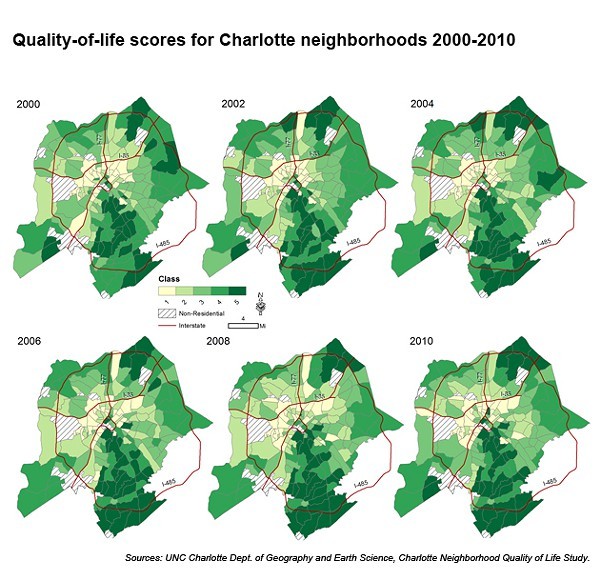UNC Charlotte researchers have studied how the Great Recession impacted Charlotte neighborhoods, and the results appear to reflect the same trends we've already heard about in the news: The affluent are fine, the poor are not losing ground.
Here's a snippet from a report on the study, which was conducted by the collaborative research program RENCI, the Renaissance Computing Institute, and UNC Charlotte's Urban Institute:
How do you define what makes people think of one neighborhood as “good” and another “bad”? Is it things such as crime, school quality and amenities? What about walkability, accessibility of employment or environmental quality? Whether you consider one or all of these characteristics, they are all important and affect the quality of life for a neighborhood's residents. Those characteristics also tend to change over time, and according to a recent study by researchers at UNC Charlotte’s Renaissance Computing Institute (RENCI), some Charlotte neighborhoods have done just that: increased or decreased their overall quality-of-life score from 2000 to 2010. Some conclusions from this study lead researchers to believe the economic recession may have played a large part in some of those changes in quality of life, and not surprisingly the impacts of the recession appear to be felt more strongly in neighborhoods with lower quality-of-life scores.
The report is in geek-speak, so let's break it down: The researchers classified Charlotte neighborhoods "into one of five classes according to their quality-of-life score for the entire decade." After analyzing those scores, and how they've changed over the last decade, this is what the team discovered:
Overall, the study showed that during the 2000-2010 decade, neighborhoods generally tended to improve their quality-of-life scores, especially those that began with low scores. It also discovered a shrinking disparity between the best and worst neighborhoods from 2000 to 2010, suggesting the urban quality-of-life landscape became more equitable during the period.
The researchers then broke things down a bit more, looking at how the Great Recession changed things. That's when they realized:
During the 2008-2010 time period, as the economic downturn began, the lowest quality-of-life neighborhoods essentially stopped their upward climb and reverted to their pre-2006 state with the chance of remaining in class one rising to 83 percent.Interestingly, this same analysis did not yield similarly negative impacts on the highest quality-of-life neighborhoods in the study. In fact, the probability of remaining in the highest quality-of-life class increased throughout the decade. These results show that in terms of neighborhood quality-of-life change, the economic downturn served to halt, or even revert, improvements made to the lowest quality-of-life neighborhoods during the start of the decade.

- UNC Charlotte Dept. of Geography and Earth Sciences, Charlotte Neighborhood Quality of Life Study
- Higher quality-of-life scores are represented by darker shading.
Read Sara Gleave and Elizabeth Delmelle's entire report on the study here.
